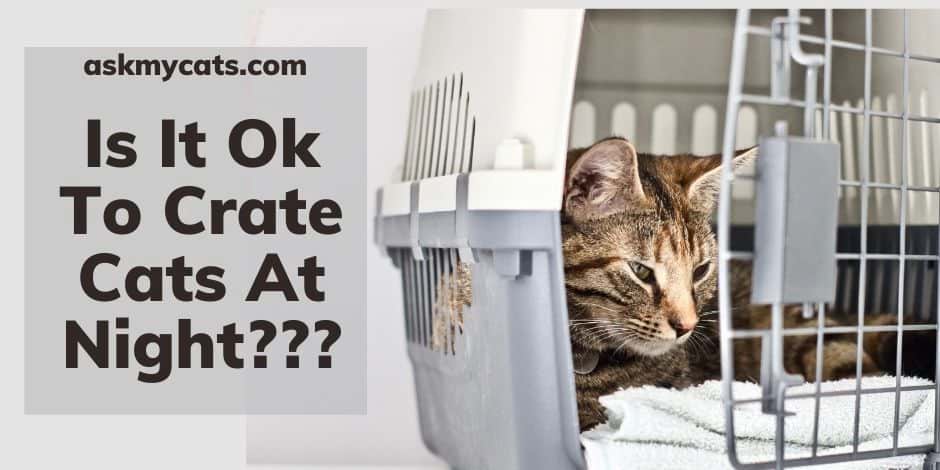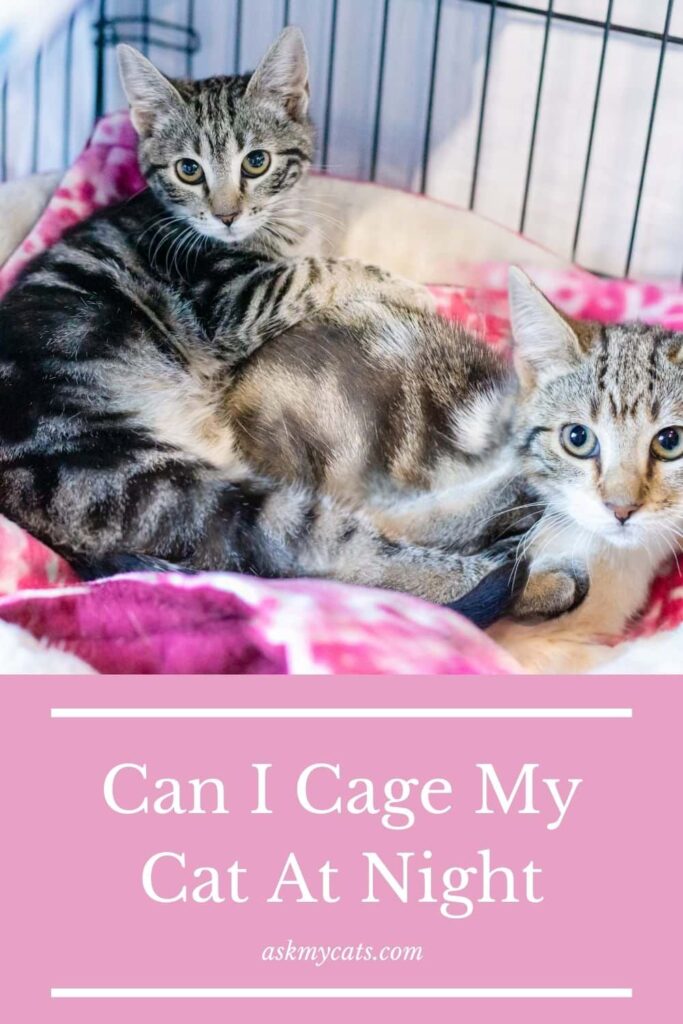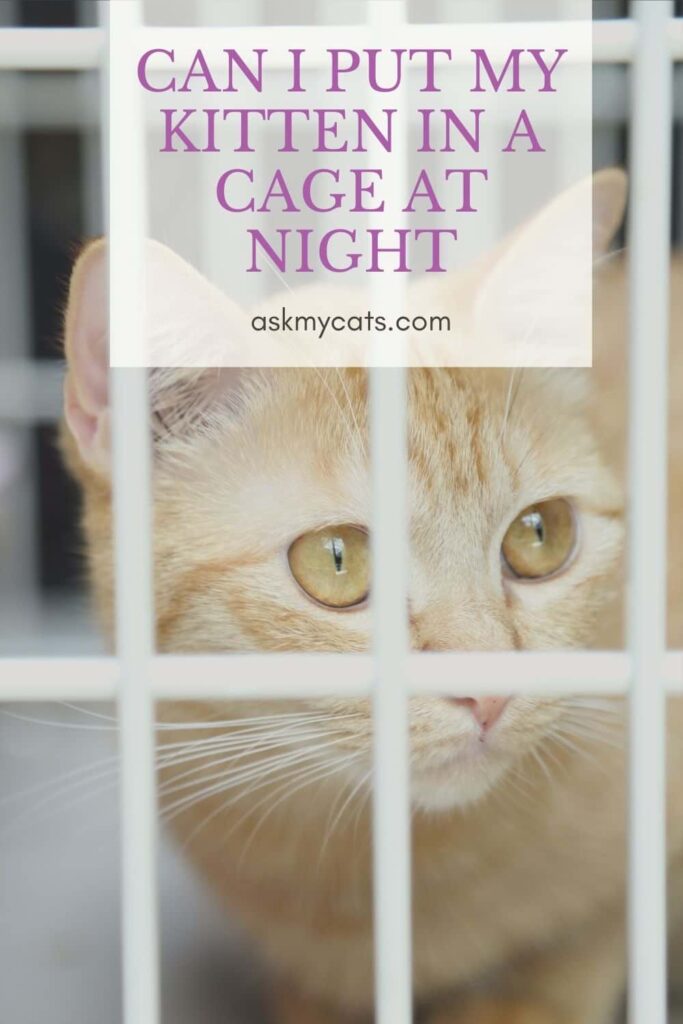It might feel like a horrible thing to do if you put a cat in a cage. But crating may also be beneficial or necessary.
When a little kitten gets caged, it’s safe and secure in the night while everyone else is asleep. And to make him feel comfortable and safe by creating an old cat that gets lost.
Caging/Crating at night is only advised if surgery has been performed recently by an adult cat. After an operation, cats need to relax and recover.
Adult cats that are happy, safe, and well-adjusted should not be caged at night.
Your cat may assume that it is being disciplined, which contributes to increased fear. This might intensify some difficulties with actions.


Give Your Cat the Perfect Day
Get the Free Ebook!
Can I Cage My Cat At Night: 9 Must-Know Facts

1. Secure Place To Retreat
No cat can remain forever in a cage, but it may be useful to retrain a cat for a few days to use its litter box, medicate it if it’s tough to do it, or expose it to new feline family members. Any rescuers crate wild kittens as they tame and socialize.
Caging is a measure of safety. To prevent cats from harming themselves and others, some owners use cages.
The advantages are that the cat’s not going to compete with other cats or won’t run away from home.
The cat is not going to chew wires or drop from a height and even won’t run over products and gets injured.
Caging a cat for these reasons, though, is inadvisable. You should consider cat-proofing your house, rather than keeping your cat in a cage. As explained, post-surgery is the only time that cages can be used for defense.
For cats that are really afraid, a door-open crate may be a safe place to retreat from other family members.
2. Noisy Cat
Another common explanation for the caging of cats is noise. Any cats keep their parents awake at night. Neighbors can also complain that living below a feline may be distracting.
Caging a loud cat is also counter-productive. Your cat is going to make its displeasure known. It’s apt to meow or ratchet the bars of the cage.
Instead of caging a loud cat, investigate why it’s so vocal. There may be a medical cause. For example, senior cats with cognitive disabilities become even more nervous and disruptive after dark.
Don’t be worried about that since studies have shown that cats are fond of crying at night or just staring aimlessly at the ceiling!
Must Read: Should My Kitten Sleep In A Crate?
3. Litter Box Accidents
Some individuals kennel felines because they don’t use a litter box at night. As a result, any accidents are encompassed in a limited region.
It’s better for the owner to scrub, but it’s unfair to the cat. Cats are scared that hunters will hunt them down because of their garbage, so they will bury them.
Having a cat survive with its own elimination is going to trigger fear. A litter box too close to food can also discourage a cat from feeding.
You have to understand that your cat is unable to use the litter box. Assess if the issue occurs just at night. The justifications must be researched. A vet will report whether your pet has a urinary tract infection.
Toilet-trained cats don’t really prevent using a litter box for no reason. Caging your kitty at night will not address the problem. You need to identify the cause of the behavior and attitude.
Also, check out about confining a cat to a room at night
4. Private Zone
Kitty’s going to enjoy going to his crate at night if you find it warm and relaxing. Place the consoler in the back so he’s going to have a soft place to sleep. Attach a small kitty condo or a cushioned bed.
He’s still going to require a litter box and food and water containers.
The bowls on the sides of the bird cages are perfect for cats because they’re off the floor and won’t attract spilled litter through the night.
5. Quarantine Time
Quarantining is a very useful activity for anyone who has more than one pet, particularly if they are the same animal.
Unfortunately, I don’t see it practiced enough for me, but this is the first line of defense against contagious diseases.
Of course, if you are adding a new cat to a household already developed, you can always make sure that it has been checked and negative for FIV/FeLV (feline leukemia and feline AIDS respectively.)
All of these infections are very infectious and fatal, so if you can avoid them, you don’t want this in your building!
For a period of time when you can keep an eye out for boogery noses or paws, parasites, skin irritations, lethargy, diarrhea, or any other symptoms of illness, cages are a perfect place to keep a new animal apart from any resident animals.
During this period, the cat can ideally be anywhere that there is no common air with the other felines-that means a garage, a shelter, a stable, a friend, or a neighbor’s home, but I know this can’t always be achieved, but having it in a different space apart from the other cats is better than none.
Quarantine has been around for at least two weeks, only if there are no symptoms, but preferably should last 4-6 weeks. This involves all rescue cats and breeders!
You might like to read about where do cats sleep outside at night
6. New Training Mode
Cages may be seen as a tool of harmony. Often, even after proper introductions, cats may begin to squabble, possibly when the kitten grows to adulthood and threatens the power structure of the family, or perhaps there is no clear cause we humans may see.
Anyway, often a resolution can be sought by caging the offending cat for a bit until it cools off. It could be appropriate to cage or crate depending on the case.
For a number of years, I had unaltered males roaming around the stud room.
Normally, during the first and second span, they were prepared to intervene again. I believe the record was four, but that was it.
After two months of this ritual, everybody was living in peace again, four unaltered adult males that I had been told beforehand that I would never be able to do it!
Interesting Read: Should You Lock Your Cat In A Bathroom At Night?

7. Running Here And There
Some people believe cats should have access to the outside. But the woods are a very risky place for a cat to be.
Studies have found that indoor/outdoor and strictly outdoor cats live significantly shorter lives on average than house cats.
It’s because of the traffic, stray dogs, assorted animals, and the risk of running into pesticides and contaminants that you wouldn’t usually have in your building.
Take, for example, your cat captures a mouse that had previously been eaten with rat poison.
If your cat catches a rodent or a few drops of sweet antifreeze in a neighbor’s open garage, the chance of its survival is not very good.
Interesting Read: Can You Keep A Cat In A Cage During The Day?
Many cats raised entirely indoors would not bother attempting to get outside, where any other cat’s territories might be. Any cats will also pursue and it could be difficult to keep other cats that were formerly indoor/outdoor cats strictly indoors.
This is because outdoor runs are a good way to cope with security challenges while also allowing fresh air and sunlight for your pet.
Any outdoor runs are simply cages or tubes outside, just wide enough to sunbathe or enjoy the outside without so much freedom to play and workout.
Other outdoor runs can be even bigger, and many are homemade. Chicken coops, roofed dog runs, or even outdoor aviaries may imitate them.
Be imaginative in looking around, since no large outdoor runs tend to be sold for pets. If this is a choice you want to look at, please notice that both a roof and a cable, concrete, or other solid bottom are needed for anything you want.
If they want to, cats can dig their way out quickly and there’s nothing to deter them.
Also, check out How Long Can a Cat Survive Locked in a Shed?
8. Breeding Troubles?
Caging may also be used to help breeders. In an open field, some females are difficult to breed, either because they roll until the male can mount them properly, or because they want to taunt the male and remain just out of control. A breeding cage is also used in these situations.
This is a very small enclosure, only large enough with no food, water, or litter box for two cats. Females need to be raised five times by males before they begin to ovulate.
This suggests that over the course of at least an hour, usually many, the cats would pair numerous times. They should be allowed out after they are done to resume their normal lives.
It is therefore important to cage the female cat a week or two before her due date. This is because you know that in an unsafe part of your house where you cannot access them or where they may be in danger, she won’t have her kittens.
Interesting Read: Why Won’t My Cat Stop Meowing In Her Cage?
9. Surgery After Effect
Cats should be caged following surgery to keep them from injuring themselves when they are sleeping.
You should cage a kitten or a previously homeless cat for 1-2 nights and allow her time to get acquainted with her new home. Enable it to wander free after this, as cats need the freedom to explore.
If you have a spare room, you can use it to restrict the movement of your pet. A cat would be allowed to stay overnight in a room if it finds it to be its own personal territory.
Just make sure your cat has all it wants, including food, water, a litter box, and stuff to keep it occupied.
Also, check out about why cat cries when locked out of bedroom
Frequently Asked Questions
Is it bad to crate a cat at night?
In specific, a content, safe, well-adjusted kitty shouldn’t require a night-time crater. If your kitten or cat has trouble making good use of the litter box, it may be safer to keep your cat in a crate at night while you teach her to use the litter box.
Should cats sleep in crates?
A cat cage should have some space away from other kitties of its own, with plenty of room to stand up, turn around, rest, and lay down for your cat. And their stay in the cage can be limited unless the pet is on vet-ordered rest. Cats require time to explore.
Is it OK to lock a cat up at night?
It’s cool to place your cat in a room alone at night, as long as your cat is safe. It is not just a question of locking it; the space, cat, and you must be prepared. You must take the time to acclimatize them to this new situation to make sure they are not anxious unreasonably.
Is it bad to keep a cat in a cage?
You don’t have to keep them all your time in the cage. These wild cats are usually allowed in the house until you are sure the cats are well handled and don’t bite or harm the owners.
Can cats hold their pee overnight?
You would not be around to pull them out to clean your cat as it vomits in your carrier. The night before and the next, you will still have water to drink – most cats can retain their urine very well for 24-48 hours.
Where should cats sleep at night?
The most common bed for cats at night is a custodial bed (34%), with 22% choice of furniture and 20% choice of own cat bed (Howell et al 2016). Most people report their cat is just part of the night on the bed and 47% estimate that the cat is just half the night or less.
Why do cats hate crates?
Most cats dislike their boxes because of their containment and the tension of their journeys. There was a mistake. Let your cat see the cabin as a cozy and healthy place and make the experience for your cat as good as possible when traveling in it.
Final Words
I hope this post has cleared up any misunderstandings that people have about cats’ caging. It’s really for the good of the cats, their welfare, and their social harmony.
I know there are catteries and rescues out there that depend for the whole life of the cat just on small cages and nothing more, and I think both humans and cats in these cases are losing out on a lot.
All and most of the cats should be kept at home, with their owner, where all are free to interact and embrace each other.
Make sure that the cage is convenient when you crate your pet at night. You don’t want to sound like your Kitty’s held captive!
Do mention your experiences of caging your cat at night. Is your cat okay with that? Is he probably angry with you? Is he ignoring you for crating him? Let us know in the comments section below.
Interesting Read: How To Get A Kitten To Sleep At Night?

Hi I place mine in a crate ; yes I make sure it’s okay when it’s inside. I have a boy and a girl cat. The boy cries so I take him out , but the girl is okay if she’s in her crate. My reason is because they chase each other down and will not let us sleep all night and people wake up cranky.. tho only the boy roams around at night in our room